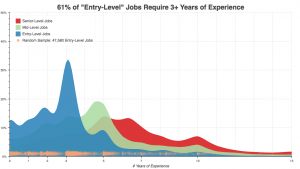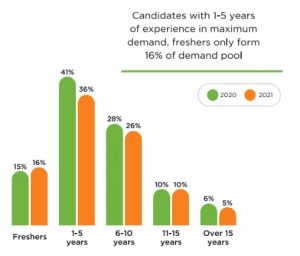
FRESHER JOBS – THE IRONY STORY
While the question of fresher’s having experience has not been new, in Covid times, it seems to have become more pertinent. It appears to be an absurd expectation to have an experienced fresher. Isn’t it an irony at its best? Simultaneously, employers are firing a large number of workers to sustain economic slowdown. Yet, keep on complaining of workforce scarcity across the globe.
FACT-FINDING
- Just in 2020, due to COVID-19, the number of fresher jobs posted in India witnessed a decrease by 40% and in the US by 68%.
- The fresher job reduction has been a trend since the last economic slowdown
- Post incline in 2019, employability of students across India has been on the decline from 2020 and continues to be the same, even today.
- All study segments (BA, BSc, BCom, MBA, MCA, B Pharma, and Polytechnic) have seen employability decline in 2021. However, as per Skill India Report – ITIs have been eliminated from the employability quotient since 2019.
- Regardless of all, there is still a positive expectation of growth in fresher hiring by 19%, yet way below what it used to be.

As per Skill India Report 2021, only 45.9% of graduates are employable. This is a decline from 46.21% in 2020 and 47.38% in 2019, the report stated. In the US, the Talent Works team researched random job postings in 2018. They analysed a random sample of 95,363 jobs. The findings suggested that 61% of full-time – fresher entry-level jobs required 3 years of experience. It is a difficult scenario for a candidate as he/she may not even be able to start the job application process for a new career yet alone qualify it.
HIGHER EDUCATION AND ITS ROI
Corporate Leaders have been talking about the skill gap for a long time. They have also been worried about the ever-growing skill gap in their employees, especially in Information Technology Industry. Most people go for higher education to land a career opportunity of their choice, which is rewarding but at the same time enhances social stature too.
In my personal experience, I have rarely met someone who felt that just having a college education helped them excelling their Job Delivery. Only a handful of freshers’ (maximum from reputed Institutions) land lucrative Job Offers. This divide between employability and existing skills does not suggest that there is no talent. However, they suggest that there is a clear divide between education and career curve. Which sometimes also makes me question, are we teaching or being given the ‘right’ education?
GOVERNMENT AND CORPORATE INITIATIVES
All industry leaders and educationists have been talking about skilling, reskilling and upskilling for a long time now. A few corporates did initiate college-professional nursery programs where Professionals guided either faculties or students to make them employable over some time. However, these initiatives have not yielded big results. Therefore, the Government of India, Ministry of HRD’s Technical education apex body AICTE came up with a platform like Swayam, NEAT – National Education Alliance for Technology.
Corporates stress upon adopting new mediums of connecting by the Academic and Industrial organization, for seamless transition of students from college to career. Yet, very small groups or percentages of corporate partners with institutions, prepare students for a career.
THE CAREER KICK START CHALLENGE: INTERNSHIP

It will be an ideal scenario – when students pursuing higher education know their career path and can be confident that their employer will provide enough avenues and space for them, to continue learning. The struggle of students landing an internship is very much real, in India. India creates approximately 22 Lakhs plus Engineers and MBAs every year, set aside other streams. Furthermore, these institutions are located across India; however, organizations are based out in few cities. In this situation accessibility and availability of internship becomes a huge challenge. No wonder why 87% of students in India struggle to get an Internship to kick start their career.

In the Indian context, 40% of fresher entry-level jobs have been replaced by 1-5 years of experience. This simply means that employers want skilled freshers at the entry-level. Virtual Internships, Certifications / Courses are the way to deal with such a scenario. Wherein, students do not only learn technology, product, concept but also the processes on which corporates operate.
REFLECTION AND WAY FORWARD
Fresher jobs have not been eliminated. Rather, to meet the market-led talent and skill demand, employers have been forced to elevate the qualifying criteria Entry-level jobs haven’t disappeared, but the criteria for what we believe to be entry-level has shifted completely.
As the shelf life of Skills is reducing day by day, it is important to acquire a learner’s mindset and focus on the learn-unlearn-relearn model for continuous success. It’s time for colleges to adapt online Learning ecosystems from the beginning of educational programs for each student. The Educational Institutions need to gamify their learning experience be it the curriculum, industry-oriented programs, skill gap assessments, AI/ML led communication or coaching. They also need to understand and make the students acquaint with -how digital technologies are coupled with corporate/professional along with Mentor led virtually enabled internships or live projects. This is also required to help students enter the mainstream of the gig economy.

All views expressed here of the writer and do not represent the opinion of any entity.
